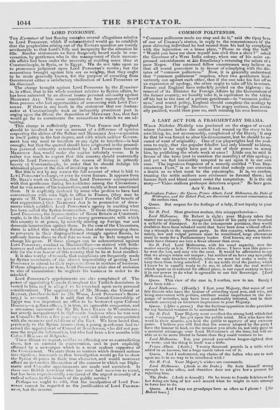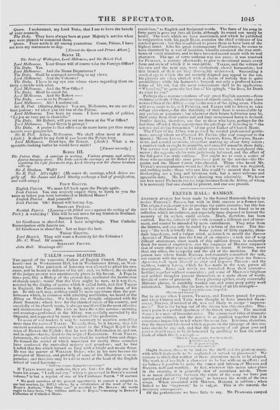A LAST ACT FOR A FRAGMENTARY DRAMA,
WHEN Nicholas Nichleby was produced on the stages of several minor theatres before the author had wound up the story to his own liking, he, not unreasonably, complained of the liberty : it may be that he was forced to alter his denouement, lest he should be ac- cused of want of originality. One of the playwrights had the cool- 'less to reply, that the popular fabulist had only himself to blame, inasmuch as he might have put it out of their power to annoy him, by publishing the whole work at once ! Little can be said in favour of the taste (not to mention the morality) of this apology; and yet we feel irresistibly tempted to act upon it in our own case. The ingenious fragment of a comedy entitled "Tim BED. CHAMBER PLOT," is so far worked out that nobody can entertain a doubt as to what must be the catastrophe. It is, we confess, treating the noble authors sans artimmtie to forestal them; but human flesh and blood cannot resist the temptation. It is the old story—" Video meliora proboque detcriora scquor." So here goes.
ACT V. SCENE I.
Buchingliton Palace the Queen, Prince Albert, Lord Melbourne, the Dube of Wellington, and Sir Robert Peel, are discovered in earnest conversation as the curtain rises.
Queen. But respect for the feelings of a lady, if not loyalty to your Queen—.
Sir R. Peel. Most gracious madam, this misapprehension— Lord Melbourne. Sir Robert is right; your Majesty takes that matter too seriously. No recognized leader of his party ever breathed a syllable of disrespect. As to the intemperate partisans, they would doubtless have been rebuked could that have been done without afford- ing a triumph to the opposite party. In this country, where, unfortu- nately, low and vulgar persons must be conciliated, large allowances must be made for a Parliamentary leader. God knows, my own block- heads have thrown me into a fever oftener than once.
Sir R. Peel. Lord Melbourne, with his usual sagacity, sees the matter exactly as it is. Politics are like chess: I have wen this game— he won the last, and may win the next. It would he affectation to say that we always retain our temper ; but neither of us have any sympathy with the rude brawlers without, whom we must let make a noise to keep them from doing mischief. I do may noble rival the justice, -which I know he is equally ready to do me, to admit that the real motive which spurs us to contend for official place, is our equal anxiety to have it in our power to do what is agreeable to our fair Sovereign. [Lord Melbourne bows.] Queen. This view of the case is, I confess, new to me. Surely I have been told— Lord Melbourne. (hastily.) I fear, your Majesty, that some of our fair friends who have the honour of attending upon you, and who, not being conversant with polities, attribute undue importance to the lan- guage of nobodies, may have been pardonably irritated, and in their warmth conveyed an incorrect impression to your Majesty.
Queen. (After a pause.) But the factious opposition to the provision for may husband remains to be accounted for.
Sir R. Peel. Your Majesty must recollect the strong hold which that word " economy " has got upon the public mind. Men who have that word in their mouths, can lead the public to approve of any extrava- gance. I believe you will find that the course adopted by the party I have the honour to lead, on the occasion you allude to, not only gave us a material advantage over Lord Melbourne's at the time, but will en- able us to be more liberal in future than they could venture to be.
Lord Melbourne. Yes, you proved yourselves longer-sighted than we were : and the thing in itself was a trifle.
Prince Albert. (Aside.) Twenty thousand pounds is a trifle when added to an ineome, hut a huge cantle taken out of it.
Queen. And I understand, my choice of the ladies who are to wait upon me 19 in no way to he interfered with ?
Sir R. Peel. Your Majesty's wishes are commands.
Lord Melbourne. (Aside to the Duke.) Ile feels himself strong enough to take office, and therefore does not give her a pretext for rejecting him.
The Dube. (Aside to himself.) Or he trusts to female fickleness for her doing ere long of her own accord what he might in vain attempt to force her to do.
Queen. And I may see grandpapa here as often as I please ? [Sir Robert bows.]
Queen. I understand, my Lord Duke, that I am to have the benefit of your counsels.
The Duke. They have always been at your Majesty's service when you were pleased to command them. Queen. Then settle it all among yourselves. Come, Prince, I have oot seen my marmozets to-day. [Exeunt the Queen and Prince Albert.]
SCENE II.
The Duke of Wellington, Lord Melbourne, and Sir Robert Peel.
Lord Melbourne. Your Grace will of course take the Foreign Office?
The Duke. Yes. Lord Melbourne. And the Home Department?
The Duke. Shall be managed according to my views.
Lord Melbourne. And the Colonies?
The Duke. I have in my eye one whose views regarding them en-
tirely ceincide with mine. Lord Melbourne. And the War Office? The Duke. Shall be cared for. Lord Melbourne. And Sir Robert —
The Duke. —is to be Premier.
Lord Melbourne. Ah! I understand. Sir R. Peel. (Getting fidgety.) You see, Melbourne, we are not the !east jealous: we allow you the run of the Palace.
Lord Melbourne. You have no cause. I have enough of
"Le jeu ne vaut pas la chandelle."
The Duke. Sir Robert, will you set me down at the War Office? Lord Melbourne. Your Grace is prompt !
The Duke. A prater in that office can do more harm yet than musty
records over gunpowder.
Sir R. Peel. Adieu, Melbourne. We shall often meet at dinner.
(Aside.) It shan't he my fault if you haunt the Palace long.
Lord Melbourne. Good-bye, Sir Robert. (Aside.) What a re- spectable-looking butler he would have made! [Exeunt severally.]
SCENE III.
The Palace Gate. A carriage in waiting. Various groupes and solitary figures lounging about. The Duke enters the carriage ; as Sir Robert Peel is putting his ;Vat foot on the step, Lord Stanley and Sir James Graham sidle up. Sir J. Graham. Well? Sir P. Peel. All's right! (He enters the carriage, which drives ra- pidly di: Sir .lames and Lord Stanley exchange a look of gratification, and walk away.)
FIRST GROUPE.
English Patriot. We must fall back upon the People again.
Irish Patriot. You can scarcely expect them to listen to you the same as before you were introduced at Holland House? English Patriot. And yourself? Irish Patriot, Oh! Repeal will last my day.
SOLITARY FIGURE.
Scottish Patriot. (Leaning with fiihkd arms against the railing of the Park.) A woful day! This will be sad news for my friends in Scotland.
SECOND GROUPE.
1st Gentleman in shovel-hut. I have misgivings. That Catholic
Emancipation stills haunts me.
2d Gentleman in shovel-hat. Let us bore the best.
THIRD GROUPE.
Lord Howick. They will want a Secretary for the Colonies ? Mr. a Wood. Of course.
SOLITARY not:nu. John Bull. Humbugs all



























 Previous page
Previous page